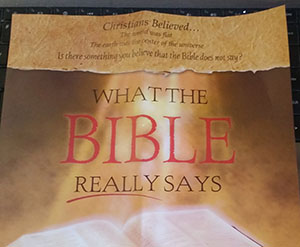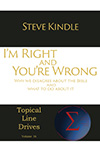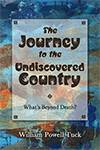What the Bible Really Says? Really?
 I opened my mailbox today to be greeted by a slick flyer inviting me to discover what the Bible really says about a variety of things. Among the the questions I’m told I can get answered: What is the future of our country during this economic downturn? What does the Bible really say about the second coming? What does the Bible really say about law and grace? What does the Bible really say about a vacation every week?
I opened my mailbox today to be greeted by a slick flyer inviting me to discover what the Bible really says about a variety of things. Among the the questions I’m told I can get answered: What is the future of our country during this economic downturn? What does the Bible really say about the second coming? What does the Bible really say about law and grace? What does the Bible really say about a vacation every week?
I’m rather well acquainted with this type of brochure, because I grew up as a Seventh-day Adventist. We had plenty of opportunities to see this sort of advertising. We were supposed to be the people who were right, and thus who would eventually straighten out the rest of the world. Well, at least those who were not destined for the lake of fire.
One of the things that my SDA teachers wanted me to learn was to go to the Bible about everything and to study it for myself. I did, and as a result I decided that the SDA church wasn’t the church for me. Especially on the topic of eschatology, I came to very different conclusions.
That’s the critical thing. The internet and the airwaves are filled with people who claim that they know precisely what the Bible teaches about almost any subject you can imagine, even when the Bible may not say much of anything about it.
To discover God’s message for you in scripture, you need to study for yourself. Now one of the things I was taught to do as a child was to look up the texts the evangelist used to see whether he was citing them correctly. There’s nothing wrong with doing so, but in a way this is a trap.
Studying the texts that someone else provides in the order and in the structure in which they provide them will very often lead you precisely to their conclusions. What you need to do is study the scriptures for yourself, in an order that you may discover, prayerfully, under the guidance of the Holy Spirit that God promises to you, not just to experts or ordained leaders.
While you’re doing that you need to examine just how it is that you come to understand the text, and especially to understand the way in which the text applies to you and to your life.
You can illustrate the problem with the way that the brochure I received talks about a “weekly vacation.” What the writers of the brochure mean is the seventh-day Sabbath. For various reasons that seem good to them, they believe that the command to keep the seventh day holy still applies, while other commands, such as various sacrifices do not. I don’t mean here to argue that they’re wrong about that, but rather that their view comes from a particular way of understanding scripture.

I remember a certain book about the King James Version, one that advocated it as the only Bible Christians should use. “It’s a very scholarly book,” I was told. “It’s filled with footnotes.” The problem is that the footnotes varied between those that were to unreliable sources, those that were plain wrong, and those that were to other examples of the author’s own work.
Similarly, just because a presentation of scripture has a large number of texts doesn’t mean it’s scriptural. Neither does it mean it’s not. What it means is that you should examine it and decide for yourself.
When I cite SDA documents many people approve. Of course we should examine (and dismiss) the claims of schismatics like Seventh-day Adventists. They are, after all, wrong! But there is no type of mistake in understanding scripture that is truly exclusive to SDAs. You’ll find these mistakes in many denominations and tradition streams.
You need to examine everything. Think about these things for yourself. Get multiple scholarly opinions and test your own work against those. If you do this, you may be surprised at how many opinions about the Bible are predetermined by the presuppositions of the person holding that opinion.
Including mine.



” . . . just because a presentation of scripture has a large number of texts doesn’t mean it’s scriptural. Neither does it mean it’s not. What it means is that you should examine it and decide for yourself.”
Priceless, Henry. Thanks.